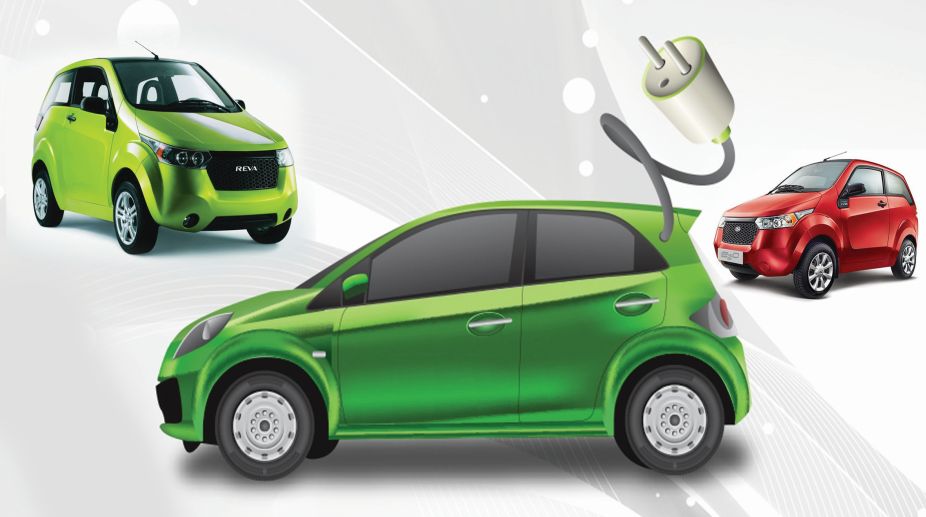India’s first electric car was launched in 2001 by Reva. Mahindra bought Reva in 2010 and renamed it Mahindra Electric. It remains the only electric passenger vehicle-maker in India.
Success has been difficult to achieve for electric cars, mainly because of lack of recharge facilities and high acquisition cost. This has made electric cars a rare sight on Indian roads.
Advertisement
In August 2017, Union Minister Piyush Goyal announced that a road map will be prepared by the Centre to ensure that only electric vehicles (EVs) will be produced and sold in the country by 2030.
The Centre planned to buy at least 10,000 electric cars. Goyal wanted the electric car industry to be driven by demand and not subsidy. He also pledged government financial support for this initiative for the first two or three years.
This announcement in 2017 surprised India’s car manufacturers but they saw it as an important and much needed boost. Car manufacturing companies like Maruti Suzuki, Mahindra and Tata Motors had already begun their electric car campaigns.
Maruti Suzuki and Toyota signed a Memorandum of Understanding according to which both companies will be working together to introduce electric cars by 2020. Japan’s Suzuki Motor will be setting up its lithium-ion battery joint venture with Toshiba and Denso, investing Rs 1151 crores to set up production facilities.
Mahindra too has announced that it will be launching two new electric cars in India by 2019. The company will be investing up to Rs 600 crores spread across three years to build the cars. Currently, Mahindra manufactures 100 EVs a day.
In September 2017, Energy Efficiency Services Ltd (EESL, made up of four public sector undertakings) awarded Rs 1120 crores to Tata Motors Ltd. to supply 10,000 electric cars. The cars will be supplied in two phases: 500 cars have already been supplied and the remaining 9500 cars will be supplied in the second phase for which no deadline has been specified.
Bajaj Auto Ltd is working on a niche business ‘Urbanite,’ which will make products in the electric two-wheeler space. These electric vehicles will be going on sale in 2020.
JSW Energy, a unit of the Sajjan Jindal JSE Group, has committed Rs 4000 crores for three years to launch EVs. State owned National Thermal Power Corp. Ltd. is seeking a pan-India license to set up charging stations. Firms like Exide Industries Ltd. and Amaron Batteries Ltd. are seeking to set up repair shops.
Despite the increase in participation by auto corporations, start-ups and investors in the government’s EV initiative, it seems that there are currently no plans to switch from cars driven by internal combustion engines to EVs by 2030. On 2 January 2018, Parliament was informed of this.
Babul Supriyo, Minister of State for Heavy Industries and Public Enterprises said, “There are, at present, no plans under consideration of the Department of Heavy Industry to make all vehicles in the country powered by electricity by 2030.”
This seemed to relieve those carmakers who were unprepared for an abrupt shift to only EVs in the transport sector. But now, in the absence of a policy, the automobile industry has no clarity as what is on the mind of the government. A policy helps in giving clarity to shareholders.
Policies are unlike action plans which can be changed easily. The industry was looking to the government to incentivise and facilitate manufacturing of electric cars, parts and charging infrastructure, to achieve economies of scale across the supply chain. Without a policy, the EV space becomes more vulnerable to the fickle-mindedness of policy-makers.
In 2015, the FAME India Scheme (Faster Adoption and Manufacturing of Hybrid and Electric Vehicles in India) was launched with the intent to support development and manufacturing in the hybrid/electric vehicles market.
Under the programme, electric and hybrid vehicles were given support by way of incentives. Its first phase comes to an end on 31 March 2018. If FAME continues beyond March 31, EV carmakers would be okay.
Despite the government taking a back step on its “EVs by 2030” decision, carmakers are still continuing with their goals of introducing EVs in India.
EESL has agreed to invest capital cost of Rs 10250 crore in Andhra Pradesh with operational cost of Rs 2000 crore per year for 1 lakh EVs. This move of the State Government will boost state employment by more than 1 lakh jobs.
The above data shows the commitment of the EV manufacturers towards making India a country where electric vehicles are a normal sight on the roads. But while this is a good thing, the companies and the government seem to have neglected the lack of infrastructure in the country for EVs to survive.
In terms of infrastructure, India lacks charging stations and battery manufacturing. EVs need to charge very often and due to lack of charging stations in India, it would be difficult for an individual to travel in an EV for a long distance.
It is impossible to say what led the government to take a U-turn on their decision of last year. The government may have realised that a sudden shift to electric vehicles was an unachievable goal.
However, broad introduction of EVs would have been a great step towards reducing carbon emissions, given the high levels of pollution in India’s cities. It would have also helped India cut down on its dependence on costly fuel imports. Now, the government should focus on developing the charging infrastructure so that EVs can be introduced in the Indian market with more ease.
The writers are, respectively, professor of law and a law student at OP Jindal Global University, Sonipat.











